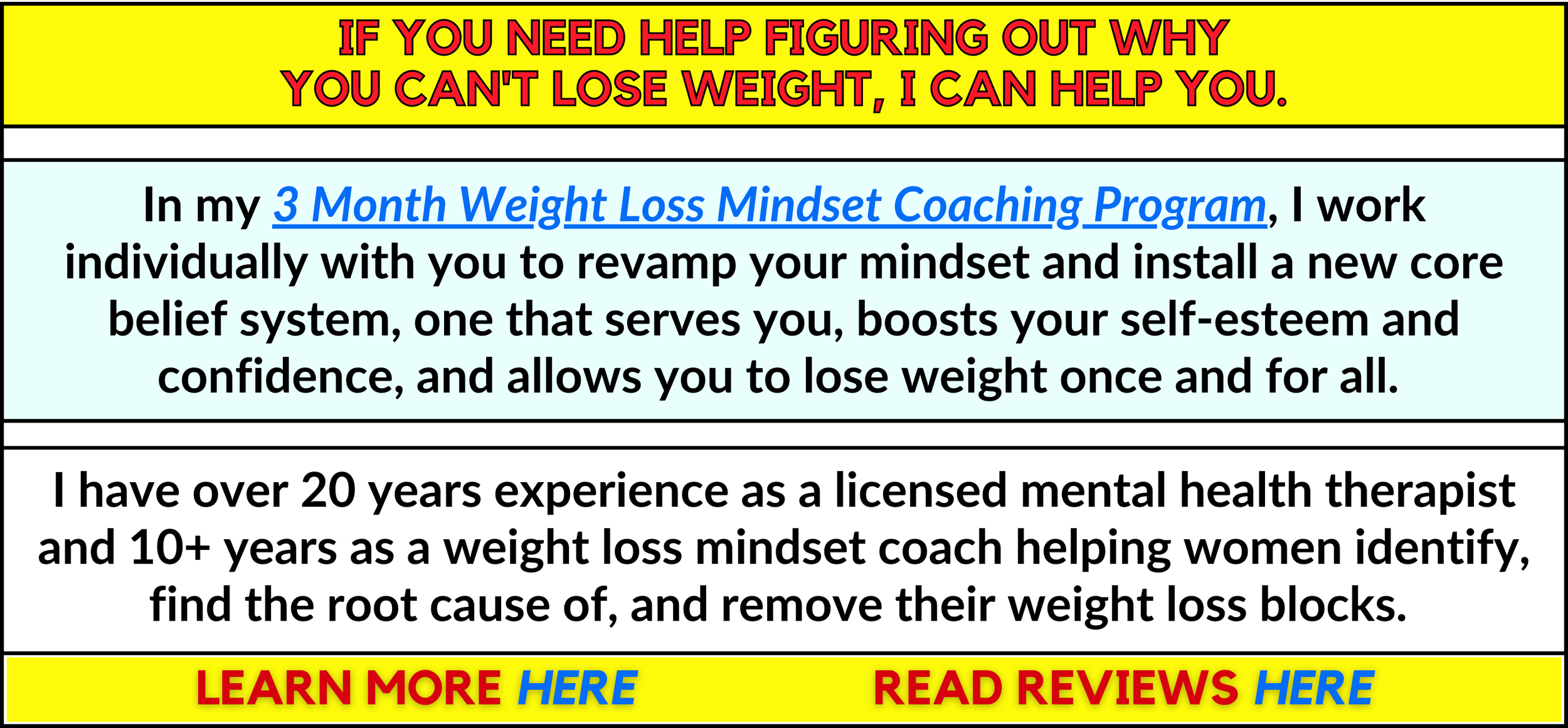All Or Nothing Mentality: How It Interferes With Losing Weight
Who Is Most At-Risk For An All Or Nothing Mentality?
Although anyone can fall victim to this mentality at one point or another in their life, there are three kinds of people who are most likely to adopt an All Or Nothing type of thinking. Do you fall into any of these categories?
Perfectionist
Over-Achiever
Control ‘Freak’
If you can identify with any of the above personality types, this is why you gravitate towards the All Or Nothing Mentality:
Perfectionist
For someone who always needs everything to go ‘perfectly’, even the tiniest hiccup can be a dramatic derailment. A perfectionist will often take on an All Or Nothing mentality, because in their perspective something either goes 100% right or it’s wrong. There’s no wiggle room or forgiveness when goals are set.
Over-Achiever
For someone who always needs to go above and beyond when tackling any type of goal or endeavor, an All Or Nothing mentality often leads the way in the pursuit of success. Over-achievers will often place exorbitant expectations on themselves and will label anything that falls short of those expectations a disappointment.
Control Freak
For someone who always needs to take control of the situation, an All Or Nothing mentality is the driving force behind the need for things to go a certain way. Control Freaks don’t fare well with variations or outcomes that stray from what they envision.
Commonalities Amongst All Three Personality Types:
1. Unrealistic Goals Are Set
Initial goals are set at unrealistic levels and fail to break down bigger goals into smaller segments. A common issue is when setting goals, the focus is on the want (end result) instead of what needs done in order to achieve the goal.
2. Alternative Solutions Are Rejected
When things don’t go as planned, it is very difficult to see alternative solutions. There is usually only one right way to achieve the goal at hand and when something isn’t working or an obstacle appears, a common response is a complete shutdown of the operation. Instead of tweaking the plan and brainstorming for substitute or replacement ideas, it’s considered a total failure and a whole new start is required.
3. Anxiety Lives In The In-Between
Life is viewed in extremes. Everything is looked at as either black or white. Things are either good or bad. Goals are either met with total success or total failure. When you live a life of extremes, there is a huge amount of in-between (gray area) that lies in the middle of the two opposite extremes. This gray area is very uncomfortable to be in and causes a lot of anxiety for someone who needs things to be a certain way. Unfortunately, to the dismay of anyone who lives with an All or Nothing mentality, most of life is lived in the middle gray area, so there is consequently a lot of anxiety that is ever-present.
How Does The All Or Nothing Mentality Prevent Us From Losing Weight?
1. Getting healthy and/or losing weight requires an acceptance that the plan will need tweaked as you go and setbacks will undoubtedly show up at times. Losing weight isn’t a linear process. There’s a lot of ups and downs (a.k.a. gray area) in a weight loss journey and for someone who sets strict goals and operates under a rigid thought process, they will be met with a lot of inner turmoil. The disappointment and anxiety that will overcome an All Or Nothing thinker during a weight loss journey will make the chances of giving up sky-rocket.
How To Fix This Mindset:
Understand that setbacks are part of any process and happen whether you’re doing everything ‘right’ or not.
Learn to be comfortable being uncomfortable in the middle gray area. Permitting yourself to feel uncomfortable, stuck, or unsure allows you the time needed to stop, reevaluate, and pivot when a plan needs tweaked.
Keeping your end goal in the back of your mind is fine, but make sure you also write down and focus on all the small goals that lead up to that mac daddy goal at the finish line. And most importantly, celebrate each small goal that is accomplished.
2. Getting healthy and/or losing weight requires a flexible plan with a loose timeline. A health journey is a roadmap that has a lot of different routes to the end destination. This is actually a good thing! It is a good thing to have many different options, ways, and solutions to reach a goal. But someone with a one-track mind who has fixed mile markers set will often become so overwhelmed and upset when not reaching these mile markers within a certain timeframe, that they then abort mission and deem it a failure.
How To Fix This Mindset:
Keep the mile markers, but lose the time restraints. Asking your body to stick to a strict timeline is make-believe thinking and is not only unrealistic, but is a surefire way to be disappointed.
Be open to letting your journey unfold and reroute your efforts as things come up. It is an impossibility to be able to predict how things will play out. Understand and accept that flexibility is a magnificent tool to have when trying to reach any goal.
3. Getting healthy and/or losing weight requires one to be self-forgiving and self-compassionate in order to offset the roadblocks and disruptors that show up in the journey. Perfectionists, Over-Achievers, and Control Freaks all share a trait that makes self-forgiveness and self-compassion difficult to practice: All of these personality types tend to be very self-critical. It’s very rare to find someone who is more critical of them than they are of themselves. In order to quickly move through roadblocks, we must be able to approach ourselves with grace, lenity, patience, and forgiveness. No goal ever gets accomplished without some missteps or lessons along the way, so it is imperative to be able to meet these obstacles with a calm, cool, and compassionate mindset.
How To Fix This Mindset:
Ask yourself what beating yourself up does for you? I’m not speaking metaphorically here. Literally ask yourself the question. In simply asking the question, you will gain insight on why this is your go-to reaction to anything less than ‘perfect’. When we are up against a problem, we need our heads to be clear and focused. Bashing ourselves and playing the shame-blame game with ourselves leaves us the opposite of clear headed and focused. It leaves us scattered, emotional, and triggered.
Express gratitude for all the things that have gone right so far, no matter how minuscule you think they are. Focusing on the good takes power away from the bad. Period.
If someone you love dearly came to you and told you they ‘messed up’ in the exact ways you believe you messed up, what would be your advice to them? I’m willing to bet you would show them compassion and point out all the things they have done right. I’m also betting you would point out that the roadblocks or mistakes that they have come up against are not because they are losers or stupid or weak, but because life happens and obstacles are a part of the process. Now… ask yourself why you can’t speak to yourself with that same compassion. Again, literally ask yourself this question. Then make it a goal of yours to start treating yourself like someone you love.
*The information on this site is not intended or implied to be a substitute for professional medical or mental health advice, diagnosis or treatment. All content in this article is for general information purposes only. I am not a doctor, nor am I a dietitian. Talk to your physician before making any changes in your diet or exercise regimen. The information found in this article is from various sources which include, but are not limited to, the sites listed above. I encourage you to do your own research and talk with your physician before making any changes in diet or exercise. What has worked for me may not work for you. This information in this article or on this website should never replace or serve as medical or mental health advice.
NEVER DISREGARD PROFESSIONAL MEDICAL ADVICE OR DELAY SEEKING MEDICAL TREATMENT BECAUSE OF SOMETHING YOU HAVE READ ON OR HAVE ACCESSED THROUGH THIS WEB SITE.








